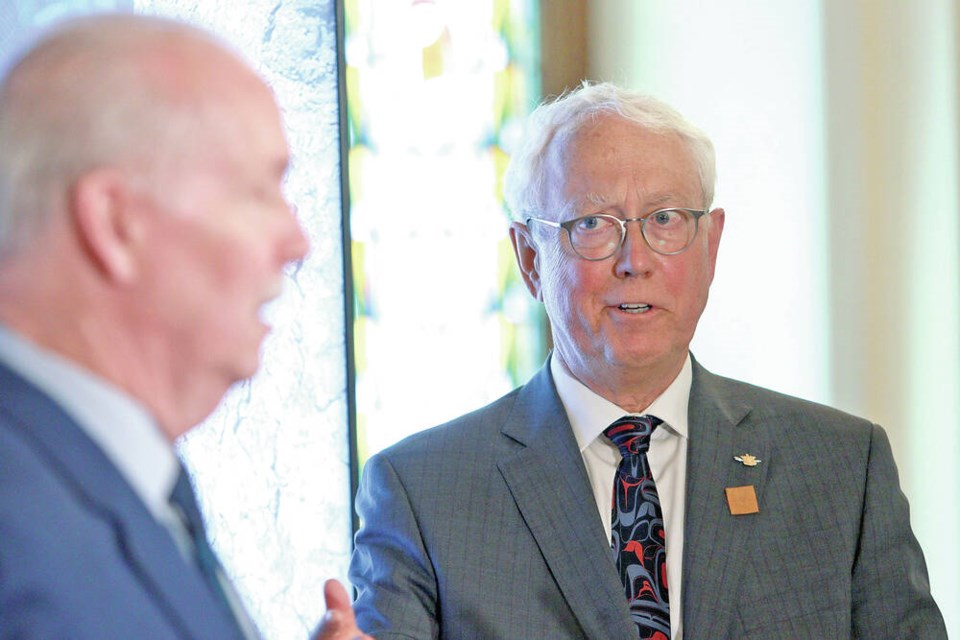The attempt to soft-pedal the alarming report on prolific offenders and random stranger attacks backfired on the NDP government Tuesday, as Opposition Liberals spent question period yelling loudly about it.
It fell to Attorney General Murray Rankin, who subbed in after David Eby quit to run for the party leadership, to defend the NDP’s law and order record. Liberals are going to load as much blame as possible for the crises highlighted in the report on “catch and release” Eby.
Solicitor General and Public Safety Minister Mike Farnworth shares some of the cabinet responsibility for the assorted breakdowns in social order. But he’s not running for the leadership and Eby is.
He has got a lot to answer for, via Rankin. The responses were mostly along the traditional lines of throwing the sa国际传媒 Liberals’ record back in their faces. A tiresome comparison of which government did the worse job of letting public safety erode fills up a lot of debate time, but accomplishes little.
(It did accidentally provide a little glimpse of some shared views. At one point, Rankin said: “You can’t simply arrest your way out of this problem.” That raised some eyebrows, but the new Liberal MLA, ex-cop Elenore Sturko, said essentially the same thing during her recent campaign.)
The main point, as hammered home in the report, is that street crime has been percolating as an issue for years, and now the two most frustrating and terrifying components — prolific offenders and random stranger attacks — have reached full boil.
That’s what prompted Eby to commission the report in the first place, after some desperate mayors compiled a list of horror stories about prolific offenders who are operating all over sa国际传媒 with impunity.
“We can’t arrest our way out of this” is a shared view. We could arrest, divert or charge, convict and/or treat. But that’s a clumsy soundbite.
Sturko made her debut in question period with another in the litany of horror stories emerging from the criminal justice system.
A prolific offender attacked an Abbotsford gas station clerk with a sword.
He was coming off a theft that netted him one day in jail, that followed bail breaches after other theft charges, that followed multiple charges that were stayed by Crown counsel, which in turn followed a break and enter that netted him probation and zero jail time.
“When will the NDP end the catch-and-release justice system of the soft-on-crime former attorney general?” she asked.
Rankin said it was the Liberals that ended a repeat-offender management program years ago. There’s a long back story to that decision. It had a lot more to do with “virulent” bureaucratic infighting than a political move to cut costs.
But regardless, that program is being dusted off and resurrected as part of the government’s initial response to the crime report.
There was a hint of one specific action during the day’s proceedings. Rankin could easily stay on as attorney general after the leadership is decided. So he’s worth listening to, for future reference.
And unlike Eby, who initially tried to downplay the crime concerns, he leans more toward accepting that a state of crisis exists.
He also talked himself into a slightly harder line as the argument continued.
“People need to accept consequences for their actions. If there’s criminal behaviour that’s been proven in a court of law, then of course people should go to jail…. I accept that there are people for whom jail is the only answer…”
The specific action to watch for is the idea of a special directive to the prosecution branch. It’s a rarely used authority in law for an attorney general to order the prosecution branch to adopt a certain policy.
Asked by the opposition if he’s ready to change the processes that contribute to “catch and release” by direct order, he acknowledged that the power exists and said: “I will examine that and all opportunities to see if that would make a difference.”
Meanwhile, he’s taking another micro-step next week toward doing something specific about the dilemma — flying to Ottawa to talk to federal Justice Minister David Lametti “about ways we can ensure that the Criminal Code and the bail provisions work in our province.”



